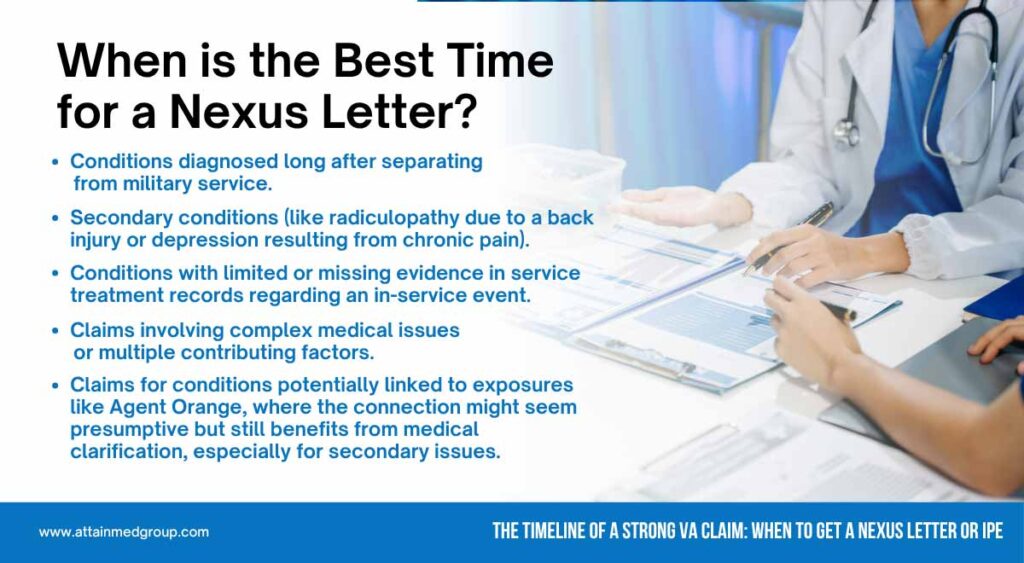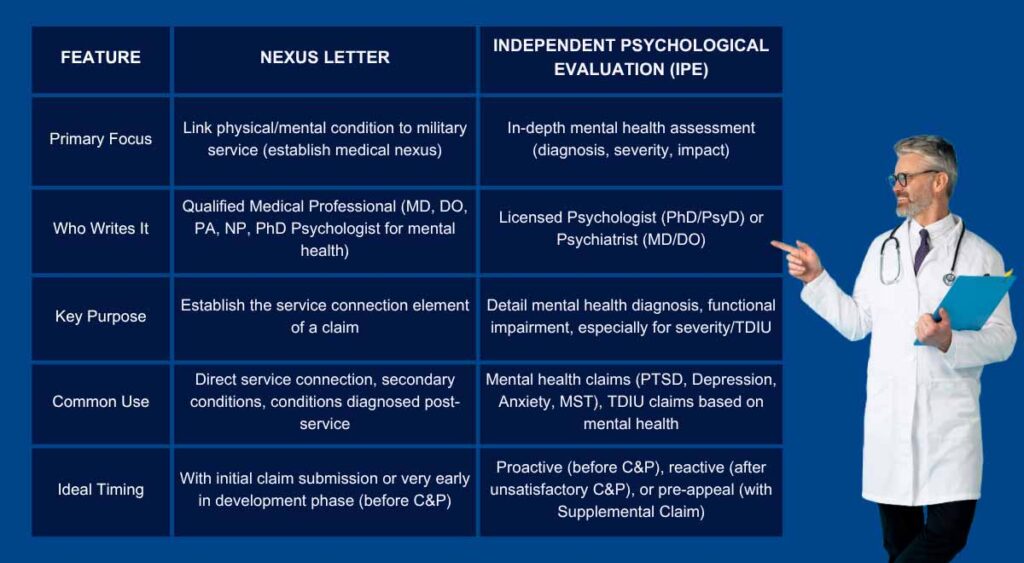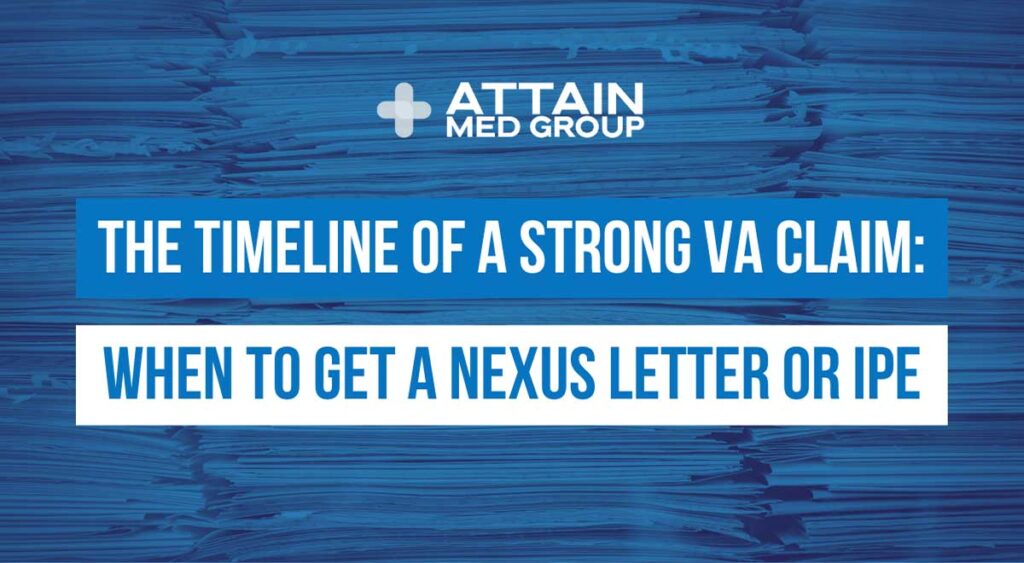Filing a VA disability claim can feel like a marathon, especially when you’re already dealing with health issues. You know you deserve benefits for your service-related conditions, but the Veterans Affairs system isn’t always straightforward. One significant piece of the puzzle is getting the right medical evidence submitted at the optimal time; getting this timing right is crucial for a successful outcome. Understanding The Timeline of a Strong VA Claim: When to Get a Nexus Letter or IPE can make a huge difference in how smoothly your claim proceeds. Knowing when to get specific documents like a Nexus Letter or an Independent Psychological Evaluation (IPE) often determines success or denial for many disability claims. It really can feel like you are running uphill sometimes, gathering paperwork and navigating deadlines. This guide explores The Timeline of a Strong VA Claim: When to Get a Nexus Letter or IPE to help you build the strongest case possible from the start when seeking disability compensation.
Understanding the VA Claim Process Stages
Before determining the best timing for your evidence, let’s quickly review the basic steps of a typical va claim. Think of the claims process like chapters in a story. Each part has its own purpose and potential challenges you might face. First comes the Initial Filing. This is where you officially inform the VA you have a medical condition related to your military service and want va disability benefits. You will submit your application, usually VA Form 21-526EZ, detailing your current disability. Next is the Development Phase. The VA reviews your file, gathers records like your service treatment records (STRs) and VA medical records, and decides if more information is needed for your va disability claim. They might ask you for more documents during this time, often with deadlines measured in business days. Then, you might have a Compensation & Pension (C&P) Exam. The VA often schedules these exams with their own doctors or contracted examiners as part of the disability claim process. Their goal is to evaluate your condition and its potential connection to service, providing a medical opinion for the VA rater. After gathering evidence and completing exams, the VA makes a Decision. They’ll send you a Rating Decision letter explaining whether your claim was approved, denied, or deferred. If approved, it will state the disability rating assigned to your medical condition. Finally, if you disagree with the decision reached at the decision stage, you enter the Appeal stage. You have different options like filing a Supplemental Claim with new and relevant evidence, asking for a Higher-Level Review of the existing record, or appealing to the Board of Veterans’ Appeals. The appeals process itself involves multiple steps and adherence to veterans law principles.

Why Timing Your Medical Evidence Matters
Think about building a house; you wouldn’t install the roof before the walls are securely in place. Submitting evidence for your VA claim works similarly; presenting the right proof at the right stage builds a solid foundation for service connection. Waiting until after a denial to gather strong medical evidence like a Nexus Letter or IPE is a common mistake many veterans make. This delay puts you in a reactive position, trying to fix problems or counter negative opinions instead of preventing them in the first place. Filing this critical medical evidence proactively shows the VA you’ve diligently prepared your case. Submitting detailed medical opinions early, especially before your C&P exam, can give the VA examiner vital context about your healthcare provider’s assessment. Providing this insight early helps frame your condition correctly from the beginning. Relying only on the C&P exam can be risky; these exams are sometimes brief, conducted by examiners unfamiliar with your full history, and might not capture the complete picture of your disability. Getting strong evidence like a va nexus letter in early sets the stage for a potentially smoother process and might even help avoid unnecessary delays in getting your disability benefits.
When is the Best Time for a Nexus Letter?
So, what exactly is a Nexus Letter? It’s a specific type of medical opinion letter written by a qualified medical professional that directly links your current disability to an event, injury, or illness that occurred during your military service. This connection, or medical nexus, is one of the essential elements needed to establish service connection according to VA regulations for disability compensation. The primary job of a va nexus letter is to bridge the gap between your time in direct service and your present medical condition. This is especially vital if the connection isn’t immediately obvious from service records or if many years have passed since you left the military. A nexus letter is also crucial for establishing secondary service connection claims – disabilities caused or aggravated by an already service-connected condition. When should you obtain and submit one? Ideally, you should submit a strong, well-reasoned Nexus Letter with your initial claim or very early in the development phase of the claim process. This means getting it into your VA file before the VA schedules your C&P exam, if possible. This medical document serves as a formal statement connecting the dots for the VA. Why is this timing advantageous? Submitting it early provides the VA rater and the C&P examiner with a clear medical rationale supporting service connection right from the start. The letter specific details help shape their understanding before they form their own opinions based solely on service records or the C&P exam. Waiting until after a negative C&P exam or a denial means you’re trying to counter an already documented opinion, which can be significantly harder and often requires an appeal. A nexus letter should explain the connection clearly. A qualified medical professional will review your records and provide a medical opinion stating it is “at least as likely as not” (the VA standard) that your condition is related to your service. The nexus letter va requires will typically include a review of relevant medical records, a rationale for the opinion, and citations to medical literature if applicable, helping to add support to your va claims. Situations where a va nexus or medical nexus letter is strongly suggested include:

Proving direct service connection claims direct service often relies heavily on this critical medical evidence.
Pinpointing the Right Moment for an Independent Psychological Evaluation (IPE)
An Independent Psychological Evaluation (IPE) is a thorough assessment conducted by a private mental health professional, such as a licensed psychologist or psychiatrist, who acts as a qualified healthcare provider. It functions similarly to a general Independent Medical Examination (IME) or independent medical opinion but concentrates specifically on mental health conditions. These conditions can include Post-Traumatic Stress Disorder (PTSD), depression, anxiety disorders, or issues related to Military Sexual Trauma (MST). What’s its purpose in the va claims process? An IPE provides an in-depth evaluation of your mental health diagnosis, clarifies its severity, and details how it impacts your daily functioning, social interactions, and ability to maintain employment. This level of detailed analysis can be very important, particularly if you feel a standard VA C&P exam might not fully capture the extent of your struggles or accurately reflect your mental health. This formal statement from a qualified healthcare professional can carry significant weight. IPEs are often very helpful in claims for Total Disability based on Individual Unemployability (TDIU). For these disability claims, you need to demonstrate that your service-connected conditions prevent you from securing and following substantially gainful employment. An IPE can powerfully document how your mental health condition contributes to this inability to work. So, when is the best time to get an IPE? The timing here can be slightly more flexible than for a Nexus Letter, but strategic planning still matters significantly. One common and effective time is after you’ve had a VA C&P exam for mental health that you believe was insufficient, inaccurate, or resulted in an unfairly low disability rating. The IPE can then serve as strong, detailed evidence to counter the C&P findings, perhaps submitted with a Supplemental Claim appealing the initial decision. Another strategic moment is before filing an appeal. If your initial va disability claim for a mental health condition was denied or rated lower than you believe is warranted, obtaining an IPE provides powerful new and relevant evidence for your appeal effort. It directly addresses the specific reasons cited for the denial or low rating in the VA’s decision letter. This independent medical opinion letter offers a fresh perspective. Sometimes, veterans choose to get an IPE proactively, even before a C&P exam is scheduled. This approach is particularly useful if they have a complex mental health history, multiple diagnoses, or anticipate difficulties proving the severity or impact of their condition. While the VA must consider all evidence submitted, providing the IPE early ensures it becomes part of your official record from the outset, potentially influencing the C&P examiner’s perspective. For TDIU claims specifically involving mental health, an IPE documenting how your condition prevents work is almost always recommended to strengthen your case for unemployability.

The Strategic Role of a Medical Record Review
Often underestimated, a professional Medical Record Review can be a potent tool in your VA claim journey. This process involves having an independent qualified medical expert meticulously examine all your available records. This includes service treatment records (STRs), VA medical center files, private physician notes, hospital records, and any other relevant medical document. What does this achieve for your va disability claim? A comprehensive review can uncover missed diagnoses, find corroborating evidence you were unaware existed, or identify crucial gaps in your documentation that need addressing. The reviewer searches for links between your military service, including specific instances or an in-service event, and your current conditions that might not be immediately apparent to you or a VA rater. This process significantly strengthens your claim narrative. It helps ensure all relevant positive information is highlighted and properly contextualized. Furthermore, it can proactively point out inconsistencies or potential weaknesses in your evidence that need to be addressed before the VA identifies them, potentially preventing hurdles down the line. When should you consider arranging a Medical Record Review? It can provide substantial value at several key points in the claim process. Getting one done before you even file your initial claim helps you build the strongest possible case from day one. It clarifies exactly what medical evidence you already possess and what might be missing, such as identifying the specific need for a Nexus Letter or specialized evaluation. It’s also highly beneficial before seeking a Nexus Letter or IPE. The reviewer can supply the specialist writing your letter or conducting your evaluation with a summarized, organized perspective of your extensive medical history. This makes their task easier and can result in a stronger, more informed medical opinion letter or independent medical opinion letter. If you’ve already received a denial, a thorough record review is critical for pinpointing precisely where the VA found deficiencies, thereby guiding your strategy for a successful appeal. It can provide insight essential for moving forward.
Building Your Strongest Claim: Integrating Evidence Effectively
Think of your Nexus Letter, IPE, and Medical Record Review as specialized instruments in your VA claim toolkit. They frequently achieve the best results when used in coordination. A detailed record review might highlight the necessity for a specific va nexus letter, and that letter, in turn, might reference key findings uncovered during the review. Similarly, an IPE might refer to both your documented service history (clarified by the review) and the service connection previously established by a Nexus Letter. The central theme throughout this process is being proactive rather than reactive. Building your case with strong, independent evidence right from the beginning is far more effective than scrambling to gather proof after encountering a setback like a claim denial. The objective is to present the Veterans Affairs department with such a clear, logical, and well-supported va claim that they possess all necessary information to grant service connection and assign the appropriate disability rating. This proactive approach directly relates to optimizing The Timeline of a Strong VA Claim: When to Get a Nexus Letter or IPE. Waiting for the VA to connect all the dots for you, or relying solely on their mandated C&P exams, leaves too much influence outside your control. While the VA technically has a “duty to assist” veterans in developing their disability claims, providing them with well-reasoned medical opinions tailored to your specific situation and medical condition makes their job significantly easier. This approach strengthens your position considerably when you’re seeking disability. Taking control of the evidence narrative often leads to better, faster outcomes for connection claims. A va disability claim requires compelling evidence.
Common Mistakes Veterans Make with Evidence Timing
Many veterans, unfortunately, discover the importance of evidence timing through difficult experiences. Understanding these common pitfalls related to the claims process can help you avoid them. Getting the timing wrong can derail even a well-deserved va disability claim. Perhaps the most significant mistake is waiting for a denial letter before seeking an independent medical opinion, such as a Nexus Letter or IPE. At this point, you are already behind schedule in the overall process. You now face the challenge of overcoming the VA’s documented reasons for refusal, which typically requires strong contradictory critical medical evidence submitted via a Supplemental Claim. Another frequent error is relying completely on the VA’s Compensation & Pension (C&P) exams to establish service connection or severity. While some C&P exams are conducted thoroughly by experienced examiners, others can be rushed or performed by individuals who may not fully grasp the nuances of your specific medical condition or its plausible link to your military service. Having your own independent medical evidence helps balance the scales and ensures your perspective is properly documented by a qualified healthcare provider familiar with your history. Submitting crucial evidence too late in the process is also problematic. If you send in a powerful va nexus letter after the VA has already made a decision on your claim, it won’t be considered for that decision. It will likely require filing a Supplemental Claim, potentially adding months or even years to the time it takes to receive your disability compensation. Aim to get strong evidence submitted during the development phase before the initial decision stage. Finally, some veterans don’t realize they need a Nexus Letter or IPE for their specific situation involving direct service connection claims direct service or secondary conditions. They might assume the link between their service and current disability is obvious or that their service medical records alone are sufficient proof. Understanding when these specific types of formal statement or medical opinion are most impactful for disability claims is critical for success. Sometimes an accredited legal professional can help identify these needs.
How Attain Med Group Helps Support the Timeline
Figuring out exactly what evidence your specific va disability claim requires, and the optimal time to submit it, can feel overwhelming. This is where organizations like Attain Med Group can assist. We focus specifically on helping veterans strengthen their VA disability claims by obtaining the right medical evidence to support their case. We help you analyze your unique situation to determine if a Nexus Letter, IPE, Medical Record Review, or other forms of documentation like Disability Benefits Questionnaires (DBQs) would be most beneficial. It’s not just about getting any evidence; it’s about securing the right evidence tailored to your specific conditions and overall claim strategy. This process often involves collaboration with a qualified medical professional. Crucially, we understand the significance of timing within the VA claims process. We guide veterans on when to pursue and submit this evidence to maximize its positive impact on their disability claim. Our goal is to empower you to be proactive, building a strong claim from the outset or developing a solid strategy for an appeal, rather than simply reacting to potential denials. This focus on timely evidence submission helps prevent unnecessary delays and strengthens your chances of achieving a favorable outcome and the disability rating you deserve under veterans law.

Conclusion
Getting the VA disability benefits you rightfully earned through your military service is important, but the process demands careful preparation and attention to detail. Medical evidence forms the bedrock of any successful va claim, and the timing of submitting that evidence is absolutely critical. Understanding The Timeline of a Strong VA Claim: When to Get a Nexus Letter or IPE allows you to approach your claim strategically and proactively. Submitting strong Nexus Letters early in the claim process, utilizing IPEs effectively for complex mental health claims or TDIU applications, and leveraging comprehensive Medical Record Reviews can make a substantial difference in the outcome. By being proactive and knowing precisely when to deploy these valuable tools, you significantly improve your chances of securing the va disability compensation you deserve without facing unnecessary delays or denials. Remembering the importance of The Timeline of a Strong VA Claim: When to Get a Nexus Letter or IPE is a key step toward successfully navigating the VA system when you’re seeking disability compensation.

